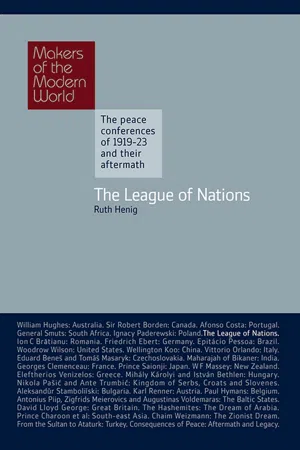History
Abyssinian Crisis
The Abyssinian Crisis, also known as the Italo-Ethiopian War, was a conflict between Italy and Ethiopia in 1935-1936. Italy's invasion of Ethiopia led to international condemnation and highlighted the weaknesses of the League of Nations in preventing aggression. The crisis ultimately contributed to the erosion of the League's authority and the onset of World War II.
Written by Perlego with AI-assistance
Related key terms
4 Key excerpts on "Abyssinian Crisis"
- eBook - ePub
Collision of Empires
Italy's Invasion of Ethiopia and its International Impact
- G. Bruce Strang(Author)
- 2016(Publication Date)
- Routledge(Publisher)
3Philip Noel-Baker, the League of Nations and the Abyssinian Crisis, 1935–1936Gaynor Johnson DOI: 10.4324/9781315572727-3When examining the existing literature on the League of Nations’ approach to the Abyssinian Crisis, it is impossible to escape negativity. The League’s actions were too little too late and displayed an extraordinary lack of insight into the motives behind Mussolini’s foreign policy, especially in North Africa. The crisis represented the last straw, the final demonstration of how poorly equipped the League was to respond to any serious challenge to its authority. Consequently, after the ‘resolution’ of the crisis in 1936, all but a few viewed the League as defunct as Europe drifted closer to the outbreak of world war in 1939. And so it goes on. As a result, it would be a difficult task indeed, in the weight of the available evidence, to try to argue to the contrary, and it is not the purpose of this chapter to embark on such a task. Instead, this chapter aims to provide a reminder that those who had championed the League since its creation were well aware of its shortcomings and certainly did not view it with rose tinted glasses. This point is at best acknowledged but glossed over by some of the existing scholarship on the Abyssinian Crisis, and is overlooked completely by the majority. In this context, most references are to Viscount Cecil of Chelwood, whose promotion of the Peace Ballot in the summer of 1935 and his use of the League of Nations Union to resurrect public consciousness about the work of the League at least in Britain.1 - eBook - ePub
A Fascist Decade of War
1935-1945 in International Perspective
- Marco Maria Aterrano, Karine Varley(Authors)
- 2020(Publication Date)
- Routledge(Publisher)
Part IThe international dimension
Policy-making and diplomacy
Passage contains an image
1 An opportunity missedBritain and the Abyssinian Crisis
Steven MorewoodIntroduction
When Saddam Hussein invaded Kuwait with overwhelming Iraqi forces in August 1990, American political commentators spoke of ‘the Abyssinia moment’. Amid comparisons between the situation facing the American-led international community and the 1930s, Republican President George H.W. Bush rose to the challenge, which became his most lauded achievement in office. The credibility of the United Nations, successor to the League of Nations, was on the line. In the event it imposed the most crippling and far-reaching sanctions in its history. When they failed to succeed in removing the aggressor, decisive military intervention followed.All this was in stark contrast to the international reaction following Benito Mussolini’s invasion of Abyssinia in October 1935. Despite quickly declaring Fascist Italy an aggressor in breach of the League Covenant, it took several weeks for the League Council to agree and implement soft sanctions, which lacked any persuasive power. Closure of the Suez Canal, thereby severing Italy’s sea communications with East Africa, and an oil sanction, were conspicuous by their absence. Not surprisingly, this ‘test case’ – the one and only occasion when Article XVI, the supposedly coercive fulcrum of the League edifice, was tried out – ended in abysmal failure. The League of Nations became an irrelevance in the international crises that followed, leading to World War II.Causes and consequences
In ascribing blame for the disastrous train of events, much culpability can be laid at the door of the French.1 But much more responsibility resides with the British who, like the Americans in 1990, had the opportunity to take the lead, indeed created expectations that they would act decisively, but instead fell back on excuses for inaction. During May 1936, Italian troops having recently marched into Addis Ababa, the Abyssinian capital, the House of Commons convened for a post-mortem. Anthony Eden, once seen as the League’s ‘golden boy’, who had succeeded the disgraced Sam Hoare as Foreign Secretary following the abortive Hoare-Laval Pact – often seen as the first act of ‘craven appeasement’ – faced hostility during his speech, including shouts of ‘resign’, ‘shame’ and ‘sabotage’. Unconvincingly, he claimed there was no support for military action, whose burden would fall predominantly on Britain as the most proximate military power. Arthur Greenwood, for Labour, replied that ‘no more deplorable speech has ever fallen from the lips of a British Minister’.2 - eBook - ePub
- George Padmore(Author)
- 2019(Publication Date)
- Routledge(Publisher)
Chapter IVAbyssinia—A Pawn in European Diplomacy“The people of Abyssinia are anxious to do right … but throughout their history they have seldom met with foreigners who did not desire to possess themselves of Abyssinian territory and to destroy their independence.”—EMPEROR HAILE SELASSIE in a note to the League of Nations, dated June 9, 1926.BEFORE discussing the political circumstances which made it possible for Italy to launch her barbarous attack upon Abyssinia, it is necessary to review the historical relations of this ancient African kingdom with Western Europe. Such a background is essential for a clear understanding of how it came about that England and France, the so-called defenders and champions of “Collective Security”, betrayed this country to a Fascist Power. The answer is that Abyssinia, as we shall show, has always been a pawn in European diplomacy, and, as such, has been sacrificed in the interests of Imperialism.Although Abyssinia had had contact with Europe as early as the sixteenth century, when the Portuguese came to its aid, in its struggle against Islamic invaders,1 it was only during the ’nineties of the last century, when the great European Powers were scrambling for territories in Africa, that the West began to take a great interest in Abyssinia.11 C. R. Markham: A History of the Abyssinian Expedition.It was during this period that Italy, thwarted in her first attempt to obtain a footing in North Africa, thanks to the annexation of Tunis by France, turned towards Abyssinia.1 In 1869, England despatched an expedition under Napier against King Theodore, who killed himself rather than fall into the hands of the British. See Markham: A History of the Abyssinian Expedition.The Italians first established themselves at Assab on the Red Sea. Later on, encouraged by England, at that time the bitter colonial rival of France, Italy began to set up garrisons at various points along the coast north of Assab, in order to prevent France from extending her influence along the Red Sea. In 1885 Massowa was annexed, and within two years the whole Eritrean littoral was under Italian occupation. - eBook - ePub
- Ruth Henig(Author)
- 2010(Publication Date)
- Haus Publishing(Publisher)
Abyssinia’s government immediately protested to the League of Nations that such agreements were contrary to her status as an independent League member, and Britain and Italy gave an assurance that they had no intention of bringing pressure to bear on Abyssinia, but that they had merely wanted to regulate possible areas of competition as between themselves. The agreement did not proceed any further, but as Francis Walters observes: ‘It was a striking example of the way in which the pre-war diplomatic process went on side by side with the new system established by the Covenant.’ 2 In 1928, Italy concluded a treaty ‘of constant peace and perpetual friendship’ with Abyssinia, binding the two signatories ‘not to engage, under any pretext, in action calculated to injure or prejudice the independence of the other’ and to submit all their disputes to conciliation or arbitration. 3 Despite this agreement, Italy was not the only power at Geneva to entertain doubts about Abyssinia’s claims to be a civilised power with settled borders and therefore entitled to League membership and protection. In the early 1930s, Mussolini stepped up his campaign to expand Italian influence in western Abyssinia, and an increasing number of Italian troops were sent to Italian Somaliland. In December, 1934, shots were exchanged at Wal-Wal in a frontier area, and around 100 Abyssinian solders and 30 natives serving with Italian forces were killed. Italy refused to deal with the incident under the 1928 agreement, whereupon Abyssinia referred it to the League under Article 11
Learn about this page
Index pages curate the most relevant extracts from our library of academic textbooks. They’ve been created using an in-house natural language model (NLM), each adding context and meaning to key research topics.



